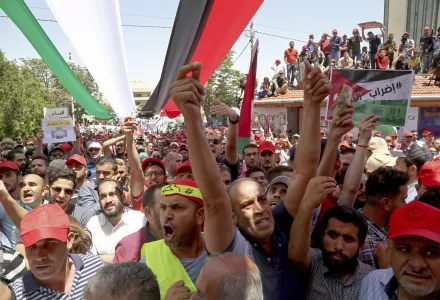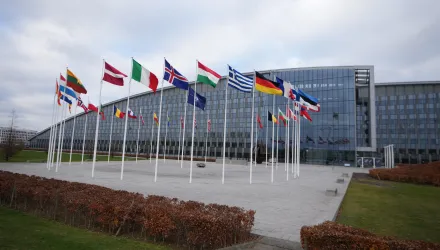
Last week, Jordan’s King Abdullah II appointed former education minister Omar Razzaz as the new prime minister after protests rocked the country. And Razzaz has already made several concessions to the protesters over taxes. But more interesting is that Razzaz said a “new social contract” will be a top item on his government’s agenda. What does a new social contract mean in the Jordanian context, and how would this help Jordan to overcome its persistent political and economic problems?
A history of short-lived governments
Dissolving the Cabinet and appointing a new prime minister is a traditional Jordanian response to popular dissent. A governmental shuffle allows the government to start fresh, suspend unpopular policies and buy time to deal with grievances in a contained way. During the Arab uprisings, which began in late 2010, Jordan’s Cabinet changed four times. IMF policies in 1989 led to a cycle of popular protest and government change, mirroring last week’s events.
This behavior dates to the early days of the state. My research tracks all 278 ministers in Jordanian governments from 1921 until 1980. I found that the Cabinets are short-lived, lasting on average 309 days. But during periods of protest and unrest, they are cut even shorter, lasting less than 100 days.
Could this government be different?
Historically, these rapid changes in government have been entrusted to veteran ministers. When protests in 1955 and 1956 led to four changes in Cabinet, the appointed prime ministers had held previous Cabinet posts between five and 16 times. But when Abdullah II dissolved the government last week, he signaled that this time is, perhaps, different. Instead of appointing a member of the political establishment, the king tapped Razzaz, a relative newcomer.
Razzaz comes from an old opposition family and previously worked in academia and economic development. His previous position as minister of education saw him usher in serious reform and take part in youth empowerment programs. Perhaps most indicative of his unorthodox approach, the Military Veterans’ Association, a powerful and conservative tribal group, condemned Razzaz’s appointment. Razzaz’s appointment is a break from normal practice, the implications of which are not yet clear.
Challenges to tax revisions
Protests continued across the country until June 7, when Razzaz announced that he would retract the proposed tax law. Jordanians who took to the street felt their taxes brought no commensurate benefits and demanded better public services, more political representation and less corruption. The withdrawal of controversial amendments that increased taxes on the middle class met protesters’ primary demand. This signals a success for the Jordanian street and the professional class who emerged as leaders of the movement.
The incoming Cabinet faces a truly difficult economic situation, however. The International Monetary Fund sponsored several changes to government entitlements that underlay the Jordanian social contract. Bread subsidies were lifted in January, while fuel and electricity prices rose substantially. The cost of living in Amman is higher than any other Arab city. With stagnant wages and price hikes, tax changes are a big pill to swallow. While the Jordanian government needs more revenue, any overhaul aimed at widening the tax base will cause friction. New promises of assistance from the Gulf will buy time but are unlikely to make a significant structural difference.
An informal economy
A major challenge is the country’s large informal sector. In Jordan, businesses must register with the ministry of industry and trade and have a business license from their municipality to operate formally, be taxed and receive social insurance benefits for employees. As the cost of living and doing business increases, firm owners find the costs of formality to be prohibitive. Many businesses eschew licensing and operate informally. A 2010 estimate suggested that 44 percent of total employment in Jordan was informal, or not taxed or monitored by the government.
Any tax changes will have to address current licensing and registration procedures without placing undue burden on the micro and small enterprise (MSE) owners who make up a large section of the economy and the majority of informal firms. There is evidence to suggest that existing licensing and registration procedures are deterring some owners from formalizing their business.
With Kristin Fabbe and Steve Monroe, I examined the relationship between MSE owners and the state using LENS survey data and re-interviewed firm owners from the original sample. In these interviews, business owners reported economic reasons for not registering, citing the high costs both from direct registration fees and from knock-on costs like utilities.
Any tax revisions will be challenged by the existing social relations between the state and business owners. Most of the literature on the informal economy assumes that informal firms hide from the state, yet we find the opposite. In Jordan, informal MSE owners are just as likely as their formal counterparts to approach the municipal council for assistance. Our data also show that informality is higher in regions with higher public sector employment in business regulation, suggesting that informality happens where linkages between state and society are thicker. Our interviews confirm that this pattern is particularly pronounced places where municipal officials and firm owners share tribal or familial ties.
Based on our findings, the existing social contract governing registration, licensing, and taxation could pose a problem to any potential changes aimed at increasing tax revenue — particularly in loyalist tribal areas. The immediate response of the state to protests signals that a change to the political economy of the existing social contract between state and society could be on the horizon.
Jordan’s old social contract is too expensive to maintain. The country cannot rely on increasingly erratic foreign aid to fund expensive entitlements like low taxation, subsidies and high public employment. If taxes are to be increased — as they must be — the new government needs a social contract based on a more transparent and inclusive dialogue between state and society.
Hartnett, Allison Spencer. “Can Jordan’s New Prime Minister Reform the Government?.” The Washington Post, June 13, 2018




